
 |
home ao english musik literatur journalismus bilder sprachen mehr shop sitemap | |
 |
 |
 |
 |
 |
(Deutsch) Heinz und Helmut sind „Die Jungs”. In der Fünf-Minuten-Dialogserie geraten die beiden in die unwahrscheinlichsten Situationen. Ab 16 Jahren |
(English) Heinz and Helmut are "The Boys". In the five-minute dialog series, the two get into the most unlikely situations. |
(Français) Heinz et Helmut sont « Les Gars ». Dans la série à dialogue de cinq minutes, les deux se retrouvent dans les situations les plus improbables. |
(Italiano) Heinz e Helmut sono "I Ragazzi". Nella serie con dialoghi di cinque minuti, i due si trovano nelle situazioni più improbabili. |
(Español) Heinz y Helmut son "Los Chicos". En esta serie de diálogos de cinco minutos, los dos se encuentran en las situaciones más inverosímiles. |
CD-Daten Sprecher: Heinz: Anis Hamadeh. Helmut: Stephan Hesping. Fanni: Juliane Link. Fiona: Andrea Stinner. Texte, Idee und Produktionsleitung: Anis. Grafik und Layout: Sabine Yacoub und Anis. Jingle: Anis (Klarinette: Stephan Hesping). Aufnahme und Mix: Thorsten Glatte. Zentralstudio Mainz Tobias Paldauf. Label: Timezone Records Osnabrück. Mainz/Osnabrück 2014. Seit dem 24.09.2023 stehen hier alle Audios der CD „Die Jungs” frei im Netz: |
|
|
|
|
(English) The title of this episode is the real headline of the first page of the Kieler Nachrichten of September 18, 2001 (translated here, of course). The editors of the newspaper received this dialog as feedback by e-mail the following day. |
 |
(Italiano) Il titolo di questo episodio è il vero titolo della prima pagina del Kieler Nachrichten del 18 settembre 2001 (ovviamente tradotto qui). I redattori del giornale hanno ricevuto questo dialogo come feedback via e-mail il giorno successivo. |
(Deutsch) Der Titel dieser Episode ist die echte Schlagzeile der ersten Seite der Kieler Nachrichten vom 18.09.2001. Die Redaktion der Zeitung hat diesen Dialog am Tag darauf per E-Mail als Feedback erhalten. Special Version | ||
Neuanfang 19.09.2001 Heinz: Du sag mal: Müssen wir jetzt trotzdem neuanfangen? |
New Beginning 19.09.2001 Heinz: Say, do we defiantly have to begin anew now? |
malgré tout 19.09.2001 Heinz : Dis-moi, est-ce qu'on doit redémarrer malgré tout maintenant ? |
nonostante tutto 19.09.2001 Heinz: Dimmi, dobbiamo ricominciare nonostante tutto adesso? |
nuevo comienzo 19.09.2001 Heinz: Dime, ¿tenemos que comenzar de nuevo desafiantemente ahora? |
(English) The title of this episode is the real headline of the front page of the Kieler Nachrichten of 19.09.2001 (translated here, of course). The editors of the newspaper received this dialog as feedback by e-mail the same afternoon. |
 |
(Italiano) Il titolo di questo episodio è il vero titolo della prima pagina del Kieler Nachrichten del 19.09.2001 (ovviamente tradotto qui). I redattori del giornale hanno ricevuto questo dialogo come feedback via e-mail lo stesso pomeriggio. |
(Deutsch) Der Titel dieser Episode ist die echte Schlagzeile der ersten Seite der Kieler Nachrichten vom 19.09.2001. Die Redaktion der Zeitung hat diesen Dialog am selben Nachmittag per E-Mail als Feedback erhalten. Special Version | ||
19.09.2001 Heinz: Du sag mal: Was bedeutet eigentlich: „Besonnenheit wächst”? |
19.09.2001 Heinz: Tell me, what do think is the meaning of "prudence is growing"? |
19.09.2001 Heinz : Dis-moi : que signifie au juste : « La Prudence grandit » ? |
19.09.2001 Heinz: Dimmi: cosa significa esattamente "la prudenza cresce"? |
19.09.2001 Heinz: Dime, ¿qué significa exactamente "la prudencia crece"? |
(English) The title of this episode is the real headline of the front page of the Kieler Nachrichten of 20.09.2001 (translated here, of course). The editors of the newspaper received this dialog as feedback by e-mail the same afternoon. |
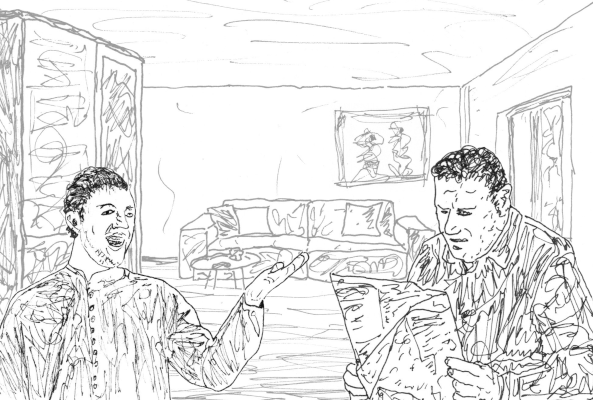 |
(Italiano) Il titolo di questo episodio è il vero titolo della prima pagina del Kieler Nachrichten del 20.09.2001 (ovviamente tradotto qui). I redattori del giornale hanno ricevuto questo dialogo come feedback via e-mail lo stesso pomeriggio. |
(Deutsch) Der Titel dieser Episode ist die echte Schlagzeile der ersten Seite der Kieler Nachrichten vom 20.09.2001. Die Redaktion der Zeitung hat diesen Dialog am selben Nachmittag per E-Mail als Feedback erhalten. Special Version | ||
20.09.2001 Heinz: Jetzt bin ich aber schon froh! |
20.09.2001 Heinz: I must say I am glad now! |
20.09.2001 Heinz : Je dois dire que je suis content maintenant ! |
20.09.2001 Heinz: Devo dire che ora sono contento! |
20.09.2001 Heinz: ¡Debo decir que ahora me alegro! |
(English) This episode also is about the headline of the day of the Kieler Nachrichten, this time from 21.09.2001. The editors of the newspaper received this dialog as feedback by e-mail the same afternoon. |
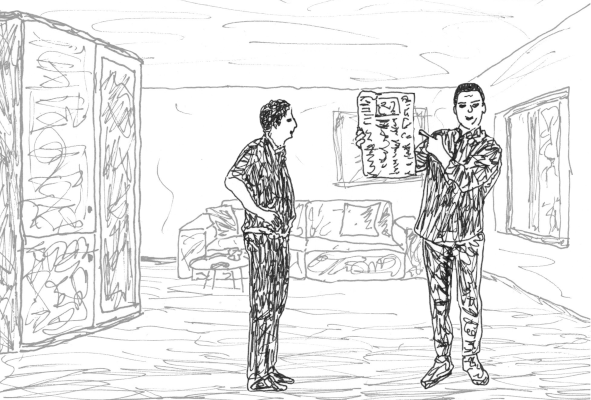 |
(Italiano) Questo episodio riguarda anche il titolo del giorno del Kieler Nachrichten, questa volta del 21 settembre 2001. I redattori del giornale hanno ricevuto questo dialogo come feedback via e-mail lo stesso pomeriggio. |
(Deutsch) Auch in dieser Folge geht es um die Schlagzeile des Tages der Kieler Nachrichten, dieses Mal vom 21.09.2001. Die Redaktion der Zeitung hat diesen Dialog am selben Nachmittag per E-Mail als Feedback erhalten. Special Version | ||
mit der Zeitung 21.09.2001 Helmut: Und? |
with the Newspaper 21.09.2001 Helmut: So? |
avec le journal 21.09.2001 Helmut : Et alors ? |
con il giornale 21.09.2001 Helmut: E allora? |
con el periódico 21.09.2001 Helmut: ¿Y qué? |
(English) This episode also is about the headline of the day of the Kieler Nachrichten, this time from 22.09.2001. The editors of the newspaper received this dialog as feedback by e-mail the same afternoon. |
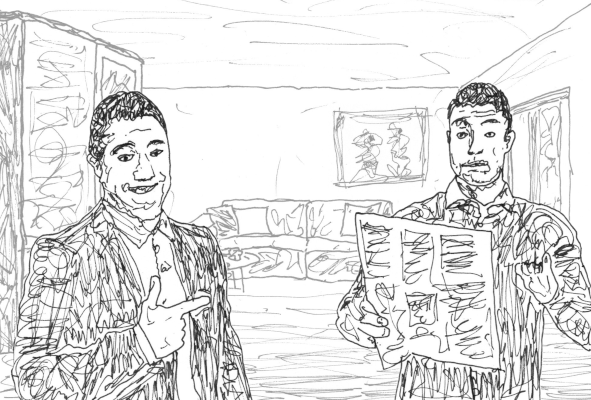 |
(Italiano) Questo episodio riguarda anche il titolo del giorno del Kieler Nachrichten, questa volta del 22 settembre 2001. I redattori del giornale hanno ricevuto questo dialogo come feedback via e-mail lo stesso pomeriggio. |
(Deutsch) Auch in dieser Folge geht es um die Schlagzeile des Tages der Kieler Nachrichten, dieses Mal vom 22.09.2001. Die Redaktion der Zeitung hat diesen Dialog am selben Nachmittag per E-Mail als Feedback erhalten. Special Version | ||
22.09.2001 Heinz: Ich glaube, die haben sich wieder beruhigt. |
22.09.2001 Heinz: I think they've calmed down again. |
22.09.2001 Heinz : Je crois qu'ils se sont calmés. |
22.09.2001 Heinz: Credo che si siano calmati. |
22.09.2001 Heinz: Creo que se han vuelto a calmar. |
(English) The Boys approach a cave in Afghanistan. How do they get there and what do they do there? Both questions will be answered, but the first only more than a hundred episodes later. |
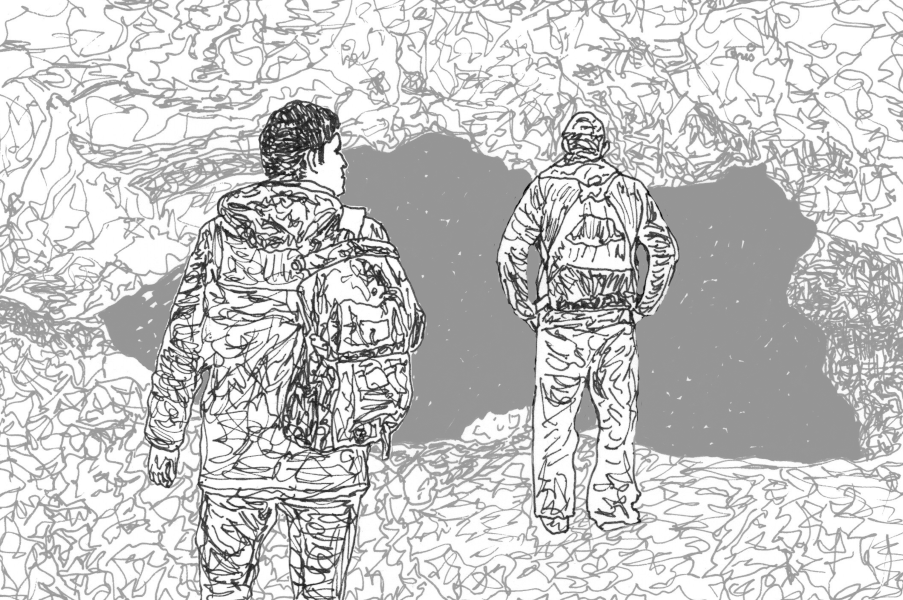 |
(Italiano) I Ragazzi si avvicinano a una grotta in Afghanistan. Come ci arrivano e cosa ci fanno? Entrambe le domande trovano risposta, ma la prima solo più di cento episodi dopo. |
(Deutsch) Die Jungs nähern sich einer Höhle in Afghanistan. Wie kommen sie dort hin und was tun sie dort? Beide Fragen werden beantwortet, die erste allerdings erst mehr als hundert Folgen später. Special Version | ||
2001 Heinz: Jetzt warte doch mal! |
2001 Heinz: Hey, wait a minute! |
2001 Heinz : Hé, attends un peu ! |
2001 Heinz: Ehi, aspetta un attimo! |
2001 Heinz: ¡Eh, espera un momento! |
(English) Heinz has become a Bahai, which he tries to explain to his friend. At first, Helmut is only surprised at the news, but as time goes on, it becomes clear that he has some deep-seated doubts. Heinz remains undeterred. |
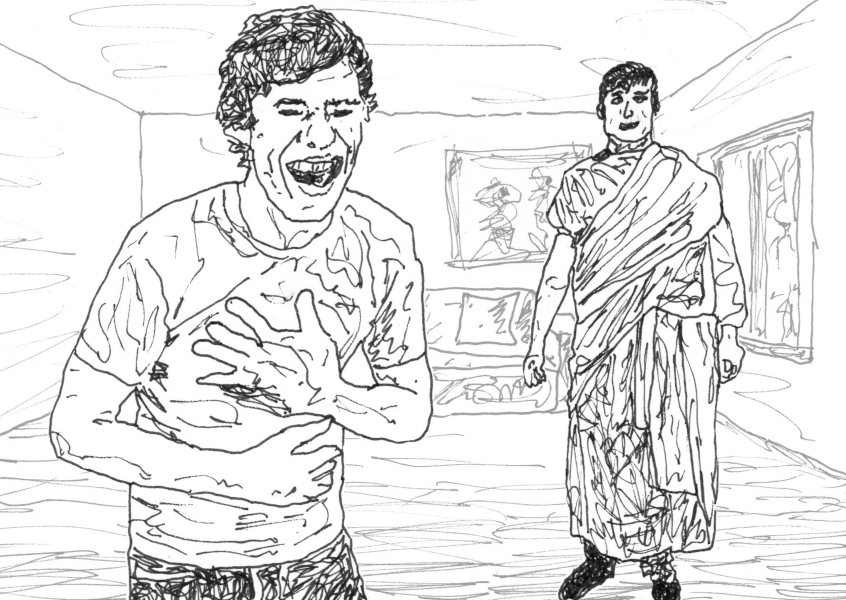 |
(Italiano) Heinz è diventato un Bahai e cerca di spiegarlo al suo amico. All'inizio Helmut è solo sorpreso dalla notizia, ma con il passare del tempo si rende conto che ha dei dubbi profondi. Heinz non si lascia influenzare. |
(Deutsch) Heinz ist Bahai geworden, was er seinem Freund zu erklären versucht. Zunächst wundert sich Helmut nur über die Neuigkeiten, doch mit der Zeit merkt man, dass er tief sitzende Zweifel hat. Heinz lässt sich nicht beirren. Special Version | ||
2001 Heinz: Choda Hafez! |
2001 Heinz: Khoda Hafez! |
2001 Heinz : Khoda Hafez ! |
2001 Heinz: Khoda Hafez! |
2001 Heinz: ¡Khoda Hafez! |
(English) When Helmut comes home from the gym, he is no longer his old self. Heinz quickly gets to the bottom of the matter and with his jaw dropped he hears what happened the hour before. He can hardly believe it. |
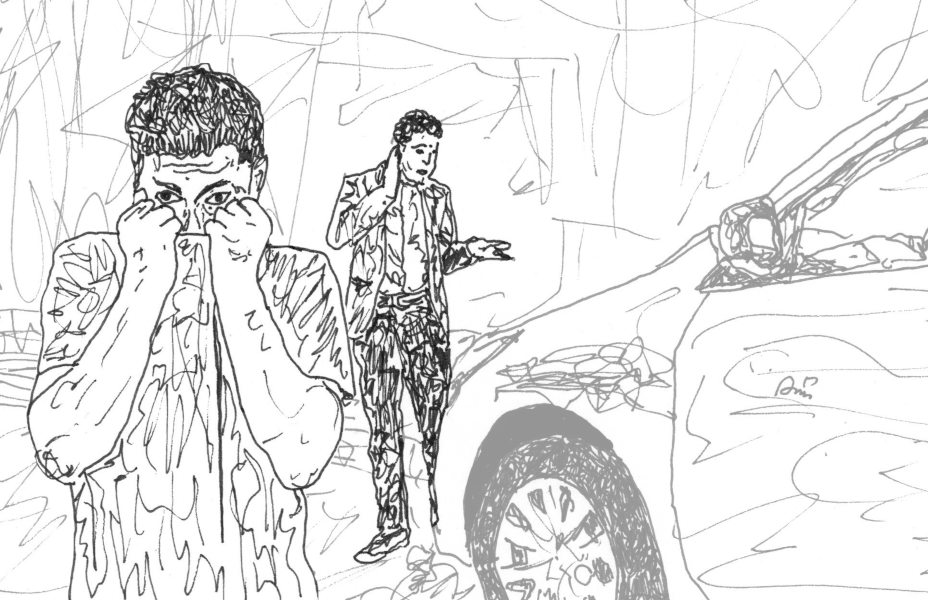 |
(Italiano) Quando Helmut torna a casa dalla palestra, non è più quello di prima. Heinz va subito a fondo della questione e con la mascella abbassata sente cosa è successo l'ora prima. Quasi non riesce a crederci. |
(Deutsch) Als Helmut aus dem Fitnessstudio nach Hause kommt, ist er nicht mehr der Alte. Heinz kommt der Sache schnell auf die Schliche und hört mit heruntergelassener Kinnlade, was sich in der Stunde zuvor abgespielt hat. Er kann es kaum glauben. Special Version | ||
2001 Heinz: Na, wie war's beim Sport? |
2001 Heinz: Well, how was it at the gym? |
2001 Heinz : Alors, comment était le sport ? |
2001 Heinz: Allora, com'è andato lo sport? |
2001 Heinz: Bueno, ¿qué tal el deporte? |
(English) Helmut is plagued by feelings of guilt. He turns to his friend, who gives him all kinds of good advice, but it turns out that Heinz himself has not yet reached the end of his wisdom. |
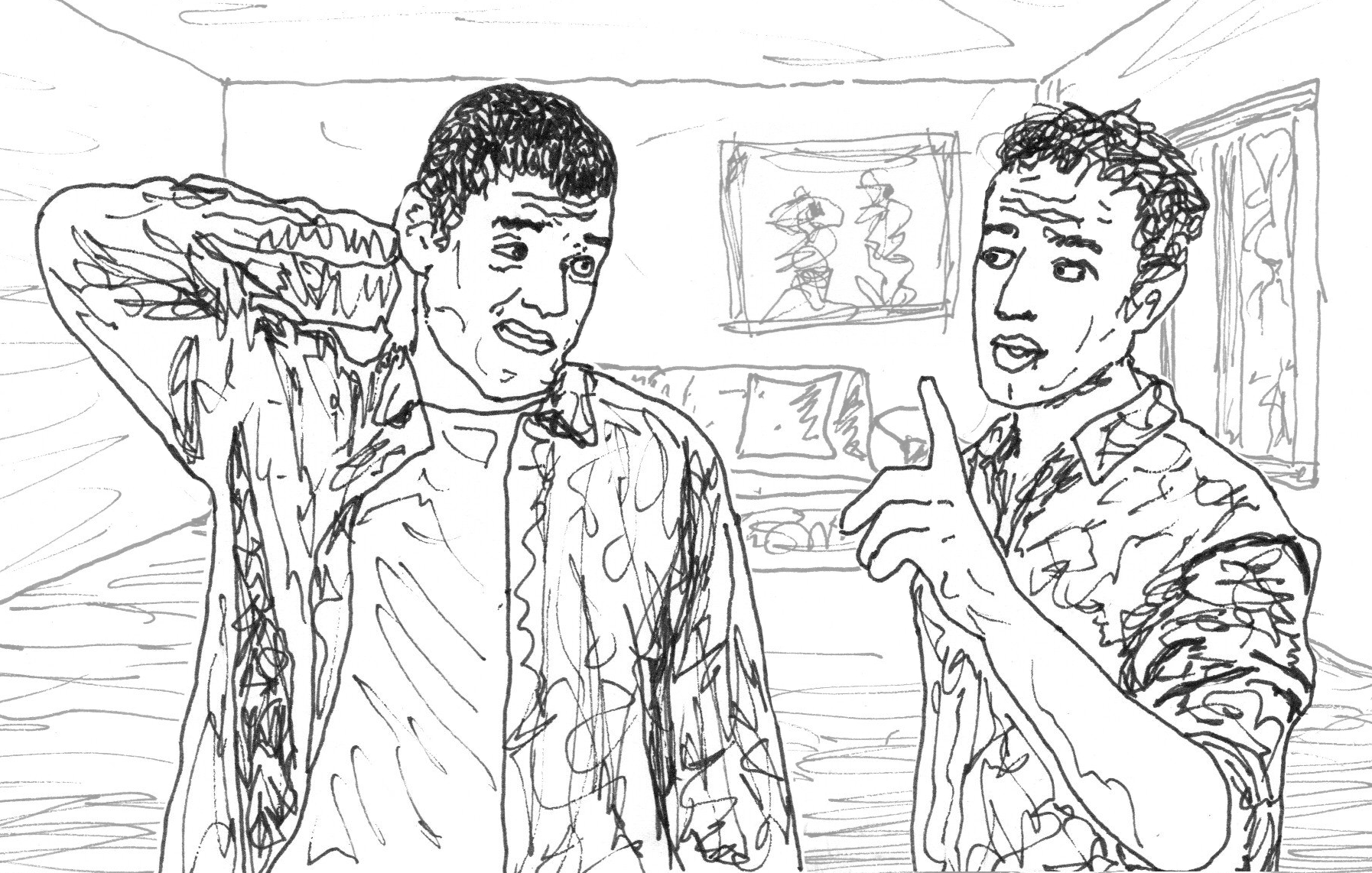 |
(Italiano) Helmut è tormentato dai sensi di colpa. Si rivolge al suo amico, che gli dà ogni tipo di buon consiglio, ma si scopre che Heinz stesso non ha ancora raggiunto la fine della sua saggezza. |
(Deutsch) Helmut plagen Schuldgefühle. Er wendet sich an seinen Freund, der ihm allerhand gute Tipps gibt, allerdings stellt sich heraus, dass Heinz selbst noch nicht am Ende der Weisheit angekommen ist. Special Version | ||
2001 Helmut: Du, Heinz, sag mal ... |
2001 Helmut: Heinz, say... |
2001 Helmut : Heinz, dis-moi... |
2001 Helmut: Dimmi, Heinz... |
2001 Helmut: Dime, Heinz... |
(English) Is it a good idea to go for a spin when one has just found a joint from the New Year's Eve party in the couch crack and enjoyed it? Opinions may be divided, but the boys make their decision. |
 |
(Italiano) È una buona idea fare un giro quando si è appena trovato una canna nella fessura del divano dopo la festa di Capodanno e la si è gustata? I pareri sono discordanti, ma i Ragazzi prendono la loro decisione. |
(Deutsch) Ob es eine gute Idee ist, eine Spritztour zu machen, wenn man gerade einen Joint vom Silvesterfest in der Couchritze gefunden und genossen hat? Man kann darüber geteilter Meinung sein, die Jungs treffen jedenfalls ihre Entscheidung. Special Version | ||
Literaturhaus 2001 Heinz: Helmuuut!! Komm mal schnell her! |
2001 Heinz: Helmuuut!! Come quickly! |
2001 Heinz : Helmuuut !! Viens vite ! |
2001 Heinz: Helmuuut!! Vieni subito! |
2001 Heinz: ¡¡Helmuuut!! ¡Ven aquí rápido! |
(English) The Boys stroll through the city and are enchanted by Kiel's charm. When Helmut gets the idea to pay a visit to the newspaper, they make a terrible discovery. |
 |
(Italiano) I Ragazzi passeggiano per la città e rimangono incantati dal fascino di Kiel. Quando a Helmut viene l'idea di fare una visita al giornale, fanno una terribile scoperta. |
(Deutsch) Die Jungs schlendern ausgelassen durch die Stadt und lassen sich vom Kieler Charme verzaubern. Als Helmut auf die Idee kommt, der Zeitung einen Besuch abzustatten, machen die beiden eine fürchterliche Entdeckung. Special Version | ||
2001 Helmut: Wieso hast du jetzt noch einen Burger? |
2001 Helmut: Why do you have another burger now? |
au journal 2001 Helmut : Pourquoi as-tu un autre burger maintenant ? |
al giornale 2001 Helmut: Perché ora hai un altro hamburger? |
2001 Helmut: ¿Por qué tienes ahora otra hamburguesa? |
(English) The bathroom needs tiling and the Boys take on the task, even though neither of them is quite up to it. Helmut just won't wake up and Heinz would rather play. Well, what could possibly go wrong? |
 |
(Italiano) Il bagno ha bisogno di essere piastrellato e i Ragazzi si assumono il compito, anche se nessuno dei due è all'altezza. Helmut non si sveglia e Heinz preferisce giocare. Beh, cosa potrebbe mai andare storto? |
(Deutsch) Das Badezimmer muss gekachelt werden und die Jungs stellen sich dieser Aufgabe, auch wenn sie beide nicht ganz bei der Sache sind. Helmut wird einfach nicht wach und Heinz will lieber spielen. Nun, was kann schon schiefgehen? Special Version | ||
2001 Helmut: Oh Mensch! Musstest du unbedingt diesen Blaumann anziehen?! |
2001 Helmut: Oh man! Did you have to put on that blue overall?! |
2001 Helmut : Oh mince ! Il fallait bien que tu mettes ce bleu de travail ?! |
2001 Helmut: Oh, cavolo! Dovevi proprio metterti quella tuta blu?! |
2001 Helmut: ¡Vaya! ¿Tenías que ponerte ese mono? |
(English) Heinz has spent all his Deutschmarks before the currency changeover and is broke, which brings him into a philosophical and at the same time Christmassy conversation with Helmut, who is not at all thrilled by what he hears. |
 |
(Italiano) Heinz ha speso tutti i suoi marchi tedeschi prima del cambio di valuta ed è al verde, il che lo porta a una conversazione filosofica e allo stesso tempo natalizia con Helmut, che non è affatto felice di ciò che sente. |
(Deutsch) Heinz hat vor der Währungsumstellung seine ganzen D-Mark ausgegeben und ist pleite, was ihn in ein philosophisches und gleichzeitig weihnachtliches Gespräch mit Helmut bringt, der ganz und gar nicht begeistert ist von dem, was er hört. Special Version | ||
12.12.2001 Heinz: Hast du mal 'n Euro? |
12.12.2001 Heinz: Have you got a euro? |
arrive 12.12.2001 Heinz : Tu as un euro ? |
12.12.2001 Heinz: Hai un euro per me? |
12.12.2001 Heinz: ¿Tienes un euro para mí? |
(English) In this dream sequence, the Boys have an unusual job to do, further away from home than ever before. It seems as if they are overwhelmed by it, but at least they manage to make it back safely. |
 |
(Italiano) In questa sequenza onirica, i ragazzi devono svolgere un lavoro insolito, lontano da casa come non mai. Sembra che siano sopraffatti, ma almeno riescono a tornare sani e salvi. |
(Deutsch) In dieser Traumsequenz haben die Jungs einen ungewöhnlichen Job zu erledigen, so weit entfernt von zu Hause wie nie zuvor. Es scheint so, als seien sie damit überfordert, doch zumindest gelingt ihnen eine sichere Rückkehr. Special Version | ||
2001 Heinz: Funktioniert dein Mikro? |
2001 Heinz: Is your microphone working? |
2001 Heinz : Ton micro fonctionne-t-il ? |
2001 Heinz: Il tuo microfono funziona? |
2001 Heinz: ¿Funciona tu micrófono? |
(English) Heinz's East Prussian uncle Waldemar stops off in Hamburg on his way to Königsberg. The Boys pick him up from the airport and spend the evening with him, which ends unexpectedly. |
 |
(Italiano) Waldemar, lo zio prussiano orientale di Heinz, arriva ad Amburgo per un viaggio secondario, passando per Königsberg. I Ragazzi lo vanno a prendere all'aeroporto e trascorrono con lui una serata che si conclude in modo inaspettato. |
(Deutsch) Heinz' ostpreussischer Onkel Waldemar kommt auf einen Abstecher nach Hamburg, auf der Durchreise nach Königsberg. Die Jungs holen ihn vom Flughafen ab und verbringen den Abend mit ihm, der unerwartet endet. Special Version | ||
2001 Heinz: Hast du das Parkticket? In diesem Stück kommen einige Fachbegriffe aus dem ostpreußischen Dialekt vor, die im Text nicht erklärt werden. Es handelt sich um folgende Vokabeln: dreibastig = vorlaut, frech ; dwatsch = dumm ; glupsch = unfreundlich, launisch ; Handschkes = Handschuhe ; Klotzkorken = Holzschuh ; Klumpatsch = Tolpatsch ; Marjell(che) = Mädchen ; Pomuchelskopp = eingeschränkter Mensch ; Ruscheldups = Zappelhans (Quelle: www.brieskorn.de/Meine_Ahnen/ Dokumentation/Ostpreussisch/ body_ostpreussisch.html). Die Credits für den Schlusssatz mit dem Barjeld gehen an Herrn Primo, der den Satz wörtlich so in einem mailinglistartigen Diskurs geschrieben hat. Er scheint aber nicht der Urheber zu sein. Man findet das, wenn man „keenichsberch + mazurka” googelt. Das Stück „Onkel Waldemar” ist dadurch motiviert, dass ich in gewisser Weise Halb-Ostpreuße bin. |
2001 Heinz: Do you have the parking ticket? There are some technical terms from the East Prussian dialect in this basically intranslatable piece that are not explained in the text. These are the following words: dreibastig = cheeky; dwatsch = stupid ; glupsch = unfriendly, moody ; Handschkes = gloves ; Klotzkorken = wooden shoe ; Klumpatsch = bumpkin; Marjell(che) = girl ; Pomuchelskopp = limited person ; Ruscheldups = fidget (source: www.brieskorn.de/Meine_Ahnen/ Dokumentation/Ostpreussisch/ body_ostpreussisch.html). The credits for the final sentence with the Barjeld go to Mr. Primo, who wrote the sentence verbatim in a mailing list-like discourse. However, he does not appear to be the author. You can find it by googling "keenichsberch + mazurka". The piece "Uncle Waldemar" is motivated by the fact that I am, in a way, half East Prussian. |
2001 Heinz : Tu as le ticket de parking ? |
2001 Heinz: Hai il biglietto del parcheggio? |
2001 Heinz: ¿Tienes el ticket del aparcamiento? |
(English) What's the best way to describe what the Boys are up to in the forest? Well, they dig and then they carry something and then they drive off again. It's not easy for either of them, that's for sure, but in the end it's the best thing they can do under the given circumstances. |
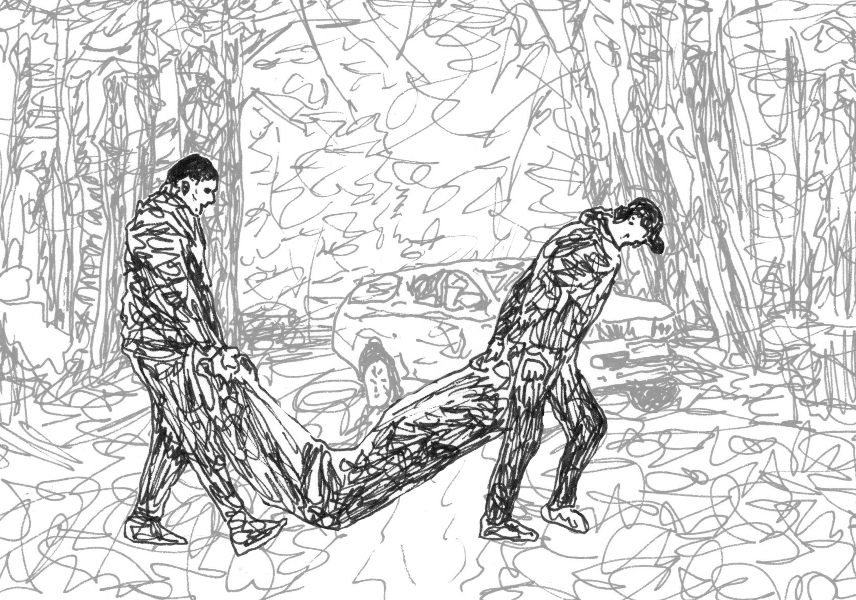 |
(Italiano) Come puoi descrivere quello che fanno i Ragazzi nella foresta? Scavano, trasportano qualcosa e poi ripartono. Non è facile per nessuno dei due, questo è certo, ma alla fine è la cosa migliore che possono fare nelle circostanze date. |
(Deutsch) Wie lässt sich beschreiben, was die Jungs da im Wald treiben? Nun, sie graben und dann tragen sie etwas und dann fahren sie wieder weg. Es fällt keinem von beiden leicht, so viel steht fest, aber am Ende ist es doch das Beste, was sie unter den gegebenen Umständen tun können. Special Version | ||
2002 Heinz: Gottseidank ist es so kalt! |
2002 Heinz: Thank god it's so cold! |
2002 Heinz : Dieu merci, il fait si froid ! |
2002 Heinz: Grazie a Dio fa così freddo! |
2002 Heinz: ¡Gracias a Dios que hace tanto frío! |
(English) Negril in Jamaica is a wonderful place and the Boys deserve a vacation. When they've had enough of the beach, they explore the surroundings and have a unique experience, each in his own way. |
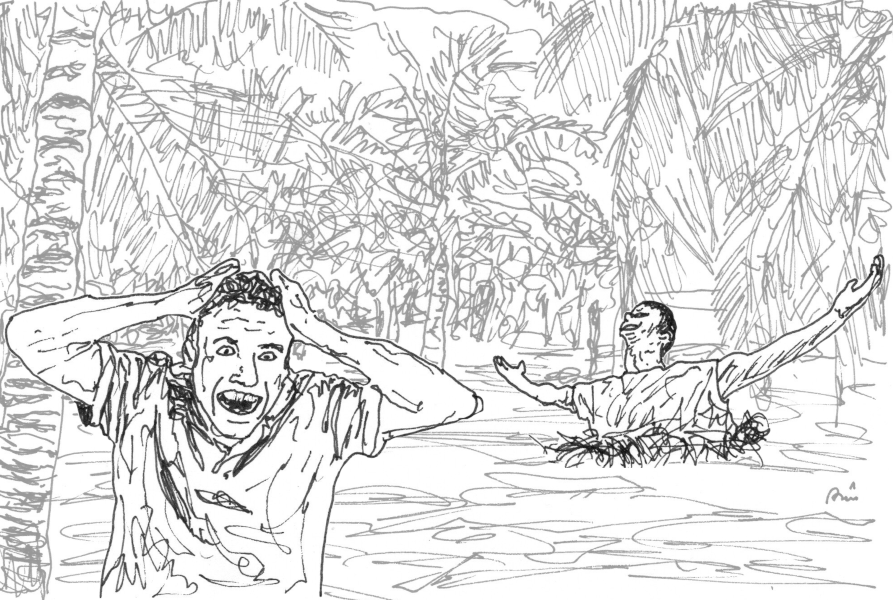 |
(Italiano) Negril, in Giamaica, è un luogo meraviglioso e i Ragazzi meritano una vacanza. Quando ne hanno abbastanza della spiaggia, esplorano il territorio e vivono un'esperienza unica, ognuno a modo suo. |
(Deutsch) Negril auf Jamaika ist ein wunderbarer Ort und die Jungs haben einen Urlaub verdient. Als sie vom Strand genug haben, erkunden sie die Umgebung und machen eine einmalige Erfahrung, jeder auf seine Art. Special Version | ||
2002 Helmut: Karibik total! |
2002 Helmut: Absolutely Caribbean! |
2002 Helmut : Caraïbes total ! |
2002 Helmut: Caraibi totale! |
2002 Helmut: ¡Caribe total! |
(English) Back in Germany, the two have a stopover in Munich, where it is strangely quiet. When Helmut sees the boutique of the famous fashion designer Moshammer from the cab, he is beside himself with excitement. The real Moshammer! With his Daisy! |
 |
(Italiano) Tornati in Germania, i due fanno una sosta a Monaco, dove c'è una strana tranquillità. Quando Helmut scorge dal taxi la boutique del famoso stilista Moshammer, è fuori di sé dall'eccitazione. Il vero Moshammer! Con la sua Daisy! |
(Deutsch) Zurück in Deutschland haben die beiden einen Zwischenstopp in München, wo es seltsam ruhig ist. Als Helmut die Boutique des bekannten Modeschöpfers Moshammer aus dem Taxi erblickt, gerät er aus dem Häuschen. Der echte Moshammer! Mit der Daisy! Special Version | ||
2002 Heinz: Was hast du denn der Stewardess noch alles zu erzählen gehabt? |
2002 Heinz: What was all this you told the flight attendant? |
2002 Heinz : Qu'est-ce que tu avais encore à dire à l'hôtesse de l'air ? |
2002 Heinz: Che cosa hai detto alla hostess? |
2002 Heinz: ¿Qué fue todo eso que le dijiste a la azafata? |
(English) Where aren't these Boys roaming? Here they are in Jerusalem, however they may have gotten there. It is not very difficult for them to adopt the local customs and traditions. |
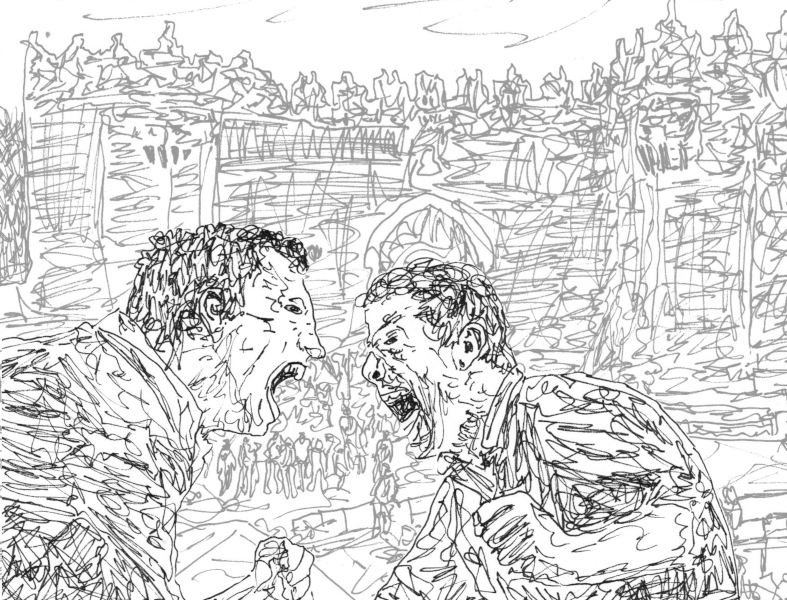 |
(Italiano) Ovunque i Ragazzi si trovino! Ora sono a Gerusalemme, in qualunque modo siano arrivati. Non è difficile per loro adottare gli usi e i costumi locali. |
(Deutsch) Wo sich die Jungs überall herumtreiben! Nun sind sie in Jerusalem, wie auch immer sie dort hingekommen sein mögen. Es fällt ihnen nicht schwer, die dortigen Sitten und Gebräuche zu übernehmen. Special Version | ||
2002 Heinz: Also, ich finde es ziemlich anstrengend, gleich schon wieder zu verreisen. |
In Jerusalem 2002 Heinz: You know, I find it rather exhausting to go traveling again so soon. |
A Jérusalem 2002 Heinz : Tu sais, je trouve que c'est plutôt épuisant de repartir en voyage si tôt. |
2002 Heinz: Sai, penso che sia piuttosto faticoso ricominciare a viaggiare così presto. |
En Jerusalén 2002 Heinz: Bueno, me parece bastante agotador volver a viajar enseguida. |
(English) What's wrong with Helmut? When he returns home from a visit to his parents, Heinz has plenty to do to bring his friend back to the present. |
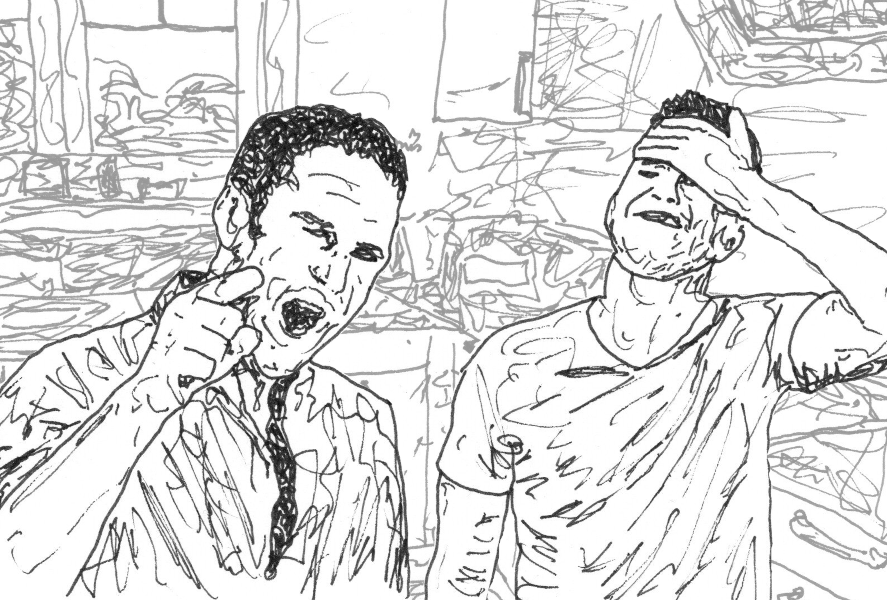 |
(Italiano) Cosa c'è che non va in Helmut? Quando torna a casa dopo una visita ai suoi genitori, Heinz ha il suo bel da fare per riportare l'amico nel presente. |
(Deutsch) Was ist denn mit Helmut los? Als er von einem Besuch von seinen Eltern nach Hause zurückkommt, hat Heinz alle Hände voll damit zu tun, seinen Freund in die Gegenwart zu holen. Special Version | ||
2002 Heinz: Und, wie war's? |
2002 Heinz: So how was it? |
2002 Heinz : Alors, comment c'était ? |
2002 Heinz: Allora, com'è andata? |
2002 Heinz: ¿Y cómo fue? |
(English) On Sunday morning of all mornings, the boiler breaks down and it's cold. Very cold. While Helmut fixes things up in the cellar, he talks to Heinz about various topics of the time. |
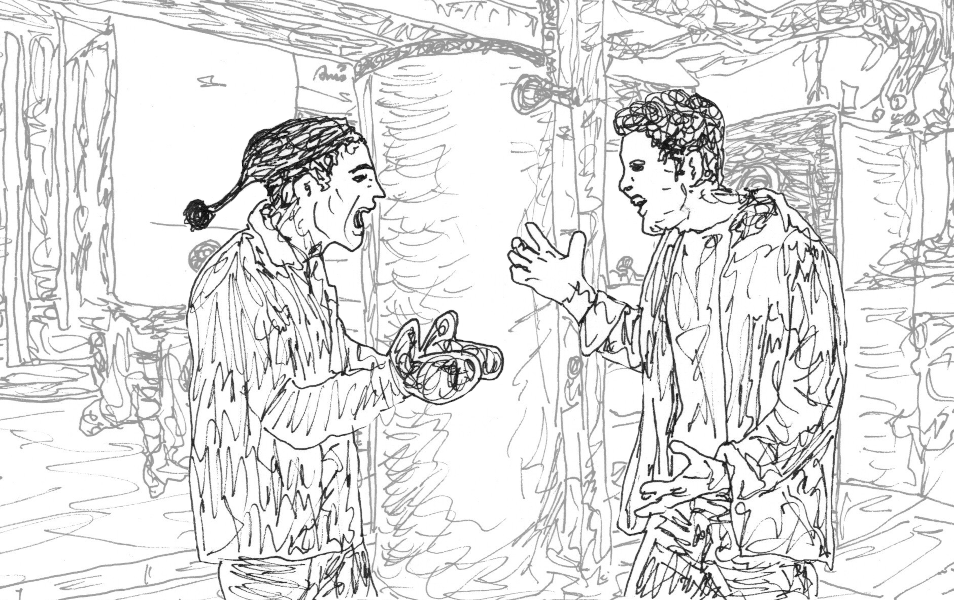 |
(Italiano) La domenica mattina di tutte le mattine, la caldaia si rompe e fa freddo. Molto freddo. Mentre Helmut ripara le cose in cantina, parla con Heinz di varie questioni attuali. |
(Deutsch) Ausgerechnet am Sonntagmorgen geht der Heizkessel kaputt und es ist kalt. Sehr kalt. Während Helmut die Sache im Keller in Ordnung bringt, unterhält er sich mit Heinz über verschiedene Themen der Zeit. Special Version | ||
Korrekt 2002 Heinz: Oh Gott, ist das kalt hier! Helmuuuuut!! |
2002 Heinz: Oh God, it's so cold in here! Helmuuuuuut!!! |
2002 Heinz : Oh mon Dieu, il fait si froid ici ! Helmuuuuut !!! |
2002 Heinz: Oh Dio, fa così freddo qui dentro! Helmuuuuuut!!! |
2002 Heinz: ¡Oh Dios, qué frío hace aquí! ¡¡¡Helmuuuuuut!!! |
(English) Helmut celebrates Western civilization after having heard the news. Heinz lets him finish before offering him an alternative view, which his friend can't get past. |
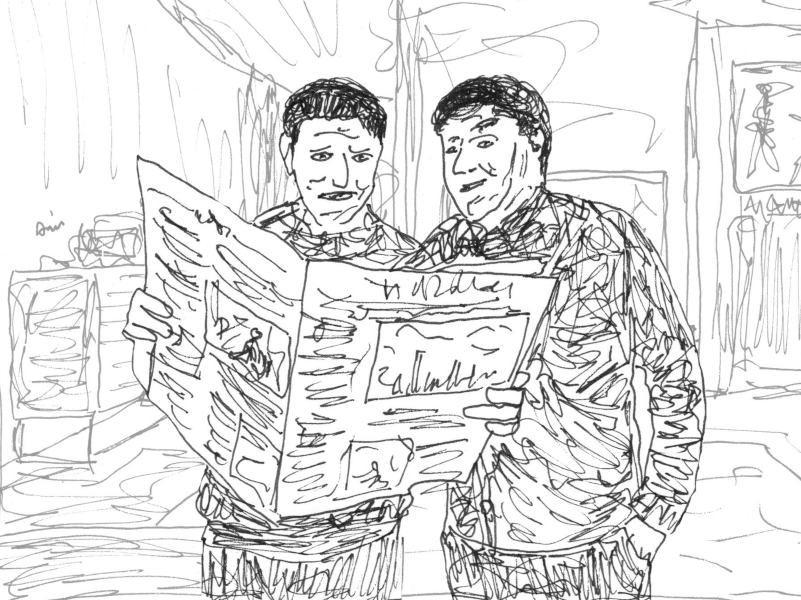 |
(Italiano) Helmut celebra la civiltà occidentale dopo aver ascoltato il telegiornale. Heinz lo lascia finire prima di offrirgli una visione alternativa, che l'amico non riesce a ignorare. |
(Deutsch) Helmut feiert die westliche Zivilisation, nachdem er die Nachrichten gehört hat. Heinz lässt ihn ausreden, bevor er ihm eine alternative Sichtweise anbietet, an der sein Freund nicht vorbeikommt. Special Version | ||
ist gefallen 10.04.2003 Heinz: Hi Helmut! |
has Fallen 10.04.2003 Heinz: Hi Helmut! |
10.04.2003 Heinz : Salut Helmut ! |
10.04.2003 Heinz: Ciao Helmut! |
10.04.2003 Heinz: ¡Hola Helmut! |
(English) Helmut has found a new job, long-term, stable and well paid. So why is Heinz so upset about it? Someone understand these Boys! |
 |
(Italiano) Helmut ha trovato un nuovo lavoro, a lungo termine, stabile e ben pagato. Allora perché Heinz è così arrabbiato? Bisogna capire questi Ragazzi! |
(Deutsch) Helmut hat einen neuen Job gefunden, langfristig, stabil und gut bezahlt. Warum also regt sich Heinz dermaßen darüber auf? Verstehe einer die Jungs! Special Version | ||
2003 Heinz: Ach, da bist du ja wieder. Hey, hast du das Auto gesehen, das da vor der Tür steht? |
2003 Heinz: Ah, you're back. Hey, have you seen the car that's parked in front of the door? |
2003 Heinz : Ah, te revoilà. Hé, tu as vu la voiture qui est garée devant la porte ? |
2003 Heinz: Ah, sei tornato. Ehi, hai visto la macchina parcheggiata fuori dalla porta? |
2003 Heinz: Ah, has vuelto. Oye, ¿has visto el coche que está aparcado delante de la puerta? |
(English) The first appearance of the Gals! Fiona tells her friend Fanni about the worrying developments in her boyfriend Heinz's apartment, which he shares with Helmut. |
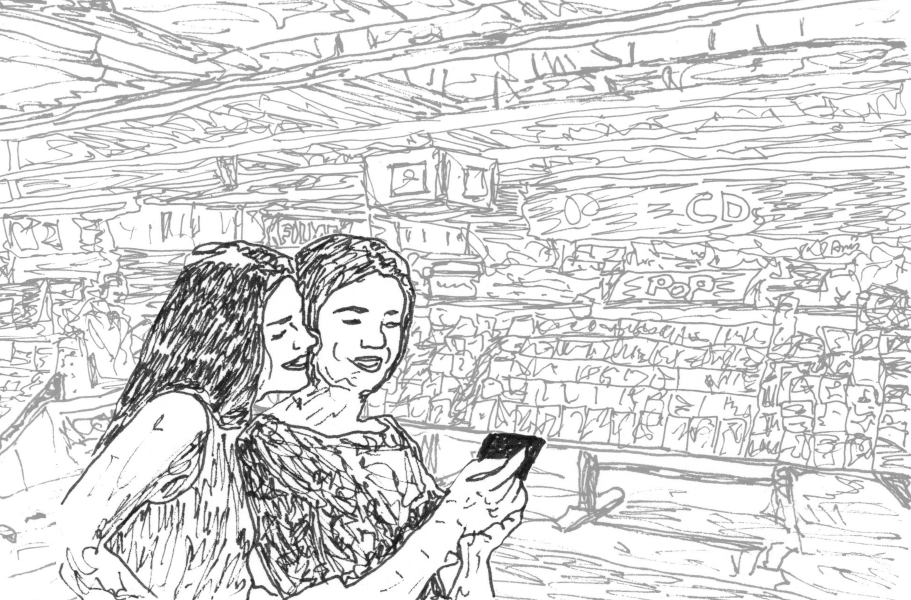 |
(Italiano) La prima apparizione delle Ragazze! Fiona racconta alla sua amica Fanni dei preoccupanti sviluppi nell'appartamento del suo ragazzo Heinz, che condivide con Helmut. |
(Deutsch) Der erste Auftritt der Mädels! Fiona erzählt ihrer Freundin Fanni von den beunruhigenden Entwicklungen in der Wohnung ihres Freunds Heinz, die er sich mit Helmut teilt. Special Version | ||
Fanni und Fiona 2003 Fiona: Fanni, kuck ma, da drüben läuft Heinz! |
Fanni and Fiona 2003 Fiona: Fanni, look, Heinz is running over there! |
Fanni et Fiona 2003 Fiona : Fanni, regarde, c'est Heinz là-bas ! |
Fanni e Fiona 2003 Fiona: Fanni, guarda, quello laggiù è Heinz! |
2003 Fiona: ¡Fanni, mira, Heinz está ahí! |
(English) At Helmut's request, the two meet on Kiel beach, where Heinz reproaches his friend, despite the beautiful view and the nature around them. For the sake of peace, Helmut finally makes some constructive suggestions. |
 |
(Italiano) Su richiesta di Helmut, i due si incontrano sulla spiaggia di Kiel, dove Heinz rimprovera l'amico, nonostante il bel panorama e la natura che li circonda. Per amore della pace, Helmut finalmente dà qualche suggerimento costruttivo. |
(Deutsch) Auf Helmuts Wunsch treffen sich die beiden am Kieler Strand, wo Heinz seinem Freund Vorhaltungen macht, trotz der schönen Aussicht und der Natur um sie herum. Um des Friedens willen macht Helmut schließlich einige konstruktive Vorschläge. Special Version | ||
2003 Heinz: Das kann ja wohl alles nicht dein Ernst sein! |
2003 Heinz: All this can't be serious! |
Le Débat 2003 Heinz : Tout ça ne peut pas être sérieux ! |
2003 Heinz: Tutto questo non può essere serio! |
La Discusión 2003 Heinz: ¡Todo esto no puede ser serio! |
(English) Helmut has received mail and brags about it to Heinz. However, Heinz has also received mail and suddenly Helmut's good mood is gone. Then he finds out some details that make him prick up his ears. |
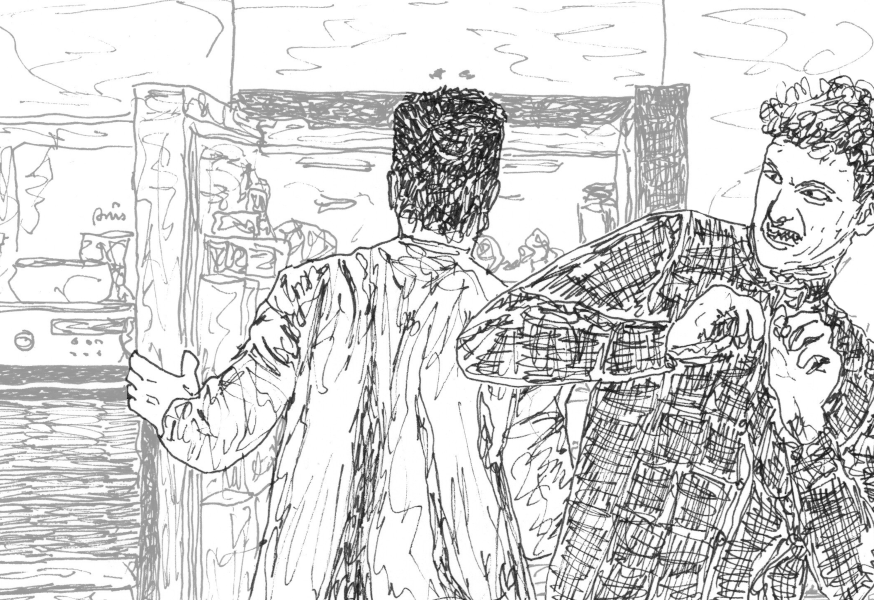 |
(Italiano) Helmut ha ricevuto della posta e se ne vanta con Heinz. Tuttavia, anche lui ha ricevuto della posta e improvvisamente il buon umore di Helmut viene meno, fino a quando non viene a conoscenza di alcuni dettagli che gli fanno drizzare le orecchie. |
(Deutsch) Helmut hat Post bekommen und prahlt damit vor Heinz. Der hat allerdings auch Post bekommen und plötzlich ist Helmuts gute Laune dahin, bis er einige Details erfährt, die ihn hellhörig machen. Special Version | ||
2008 Heinz: Also Helmut, nun bin ich schon froh ... |
2008 Heinz: Well Helmut, now I am glad... |
2008 Heinz : Eh bien Helmut, maintenant je suis content... |
2008 Heinz: Bene Helmut, ora sono contento... |
2008 Heinz: Bueno Helmut, ahora me alegro... |
(English) The exhaust has a hole in it. Fortunately, Heinz has met a trustworthy mechanic at the wine market. In his garage, however, Helmut gets distracted and ventures into dangerous territory. |
 |
(Italiano) Lo scarico ha un buco. Fortunatamente, Heinz ha incontrato un meccanico di fiducia al mercato del vino. Nel suo garage, però, Helmut si distrae ed entra in sfere pericolose. |
(Deutsch) Der Auspuff hat ein Loch. Zum Glück hat Heinz auf dem Weinmarkt einen vertrauenswürdigen Mechaniker kennengelernt. In seiner Autowerkstatt allerdings wird Helmut abgelenkt und begibt sich in gefährliche Sphären. Special Version | ||
2010 Helmut: Heinz für Mainz ... Mainzer Heinz ... |
2010 Helmut: Heinz for Mainz... Mainzian Heinz... |
2010 Helmut : Hayence pour Mayence... Heinz à Mainz... |
2010 Helmut: Heinz per Mainz... Haionza di Magonza... |
2010 Helmut: Heinz de Mainz... Mainz por Heinz... |
(English) Heinz wants to put up the shower curtain and drills into a power line. When Helmut finds him electrified like that, he is glad that his friend can still talk, even though they immediately start arguing. |
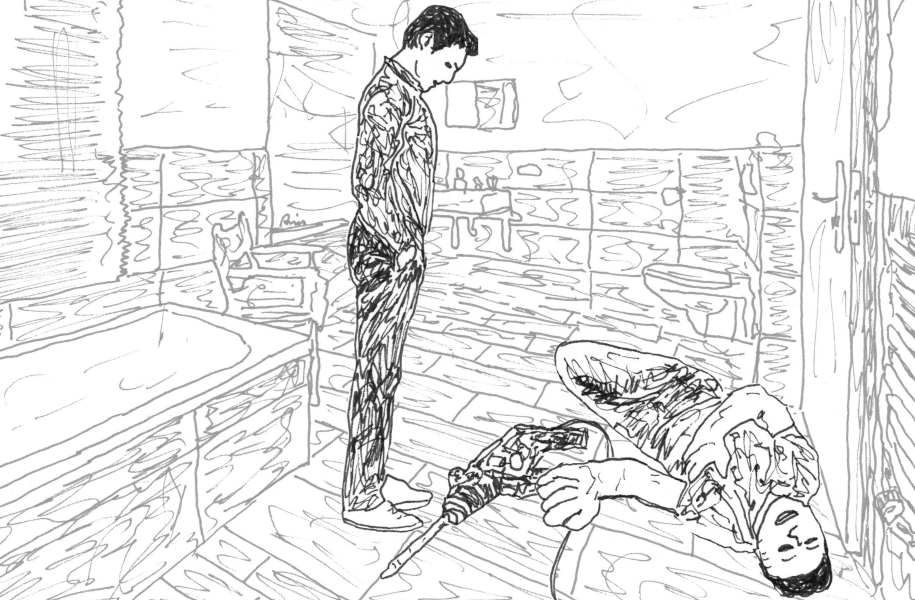 |
(Italiano) Heinz vuole montare la tenda della doccia e trapana una linea di corrente forte. Quando Helmut lo trova così elettrificato, è contento che il suo amico riesca ancora a parlare, anche se i due iniziano subito a litigare. |
(Deutsch) Heinz will den Duschvorhang anbringen und bohrt dabei auf eine Starkstromleitung. Als Helmut ihn so elektrisiert vorfindet, ist er froh, dass sein Freund noch reden kann, auch wenn sie gleich zu streiten anfangen. Special Version | ||
Starkstrom 2011 Helmut: Hallo! ... Äh, wieso geht denn das Licht nicht? Heinz? Bist du da? Haaheinz! |
2011 Helmut: Hello! ... Er, why doesn't the light work? Heinz? Are you there? Haaheinz! |
Courant fort 2011 Helmut : Salut ! ... Euh, pourquoi la lumière ne fonctionne pas ? Heinz ? Tu es là ? Haaheinz ! |
2011 Helmut: Ciao! ... Ehm, perché la luce non funziona? Heinz? Ci sei? Haaheinz! |
2011 Helmut: ¡Hola! ... Eh, ¿por qué no funciona la luz? ¿Heinz? ¿Estás ahí? ¡Haaheinz! |
(English) Amazing how quickly Fanni gets to know people! Fiona talks to her about it when she comes to Fanni's party and they chat in the kitchen, where it's not so noisy. There Fanni makes a discovery that gives her some ideas. |
 |
(Italiano) È incredibile quanto velocemente Fanni riesca a conoscere le persone! Fiona gliene parla quando viene alla festa di Fanni e chiacchierano in cucina, dove non c'è tanto rumore. Lì, Fanni fa una scoperta che le dà qualche idea. |
(Deutsch) Erstaunlich, wie schnell Fanni Leute kennenlernt! Fiona spricht sie darauf an, als sie zu Fannis Party kommt und sie sich in der Küche unterhalten, wo es nicht so laut ist. Dabei macht Fanni eine Entdeckung, die sie auf Ideen bringt. Special Version | ||
2011 Fiona: Hi Fanni! Und, läuft die Party schon? |
2011 Fiona: Hi Fanni! So, has the party started yet? |
2011 Fiona : Salut Fanni ! Alors, la fête a déjà commencé ? |
2011 Fiona: Ciao Fanni! Allora, la festa è già iniziata? |
2011 Fiona: ¡Hola Fanni! ¿Ya ha empezado la fiesta? |
(English) Anyone who has ever toyed with the idea of swimming across the Rhine from Mainz to Wiesbaden in fine weather should read the following report before putting on their swimming trunks. Or swimsuits, for that matter. |
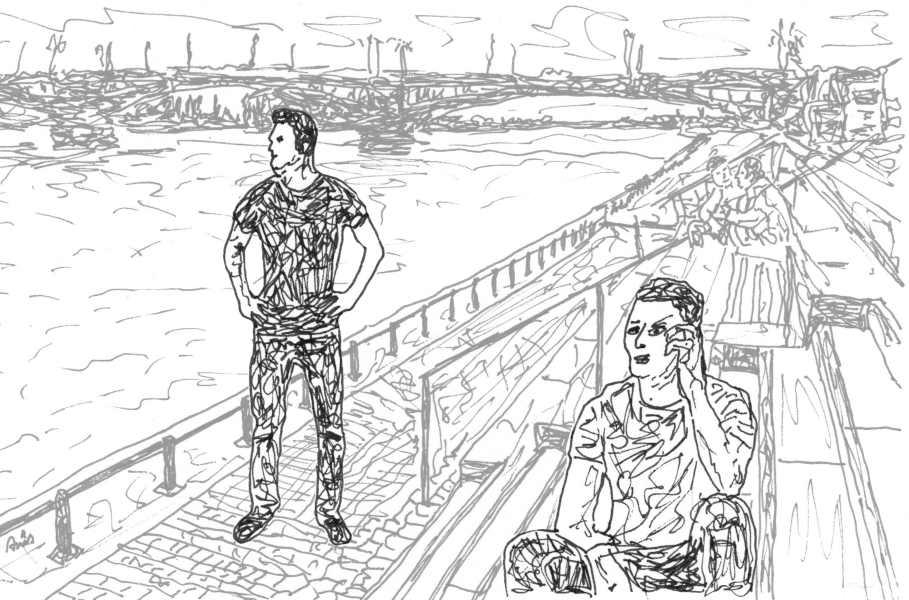 |
(Italiano) Chiunque abbia mai accarezzato l'idea di attraversare a nuoto il Reno da Magonza a Wiesbaden con il bel tempo dovrebbe leggere il seguente resoconto prima di indossare il costume da bagno. |
(Deutsch) Wer jemals mit dem Gedanken gespielt hat, bei schönem Wetter quer durch den Rhein von Mainz nach Wiesbaden zu schwimmen, sollte sich erst einmal den folgenden Bericht durchlesen, bevor er oder sie sich die Badehose anzieht. Oder den Badeanzug. Special Version | ||
2011 Helmut: Der Sommer ist zurückgekommen. Kuck mal die da! |
2011 Helmut: Summer has come back. Oh, look at her! |
2011 Helmut : L'été est revenu. Oh, regarde celle-là ! |
2011 Helmut: L'estate è tornata. Oh, guarda questa! |
2011 Helmut: Ha vuelto el verano. Oh, ¡mira esta! |
(English) When Heinz returns from a seminar, he finds the apartment in a desolate state. Helmut tells his friend about his new job, but Heinz doesn't seem too enthusiastic about the direction Helmut's life is taking. |
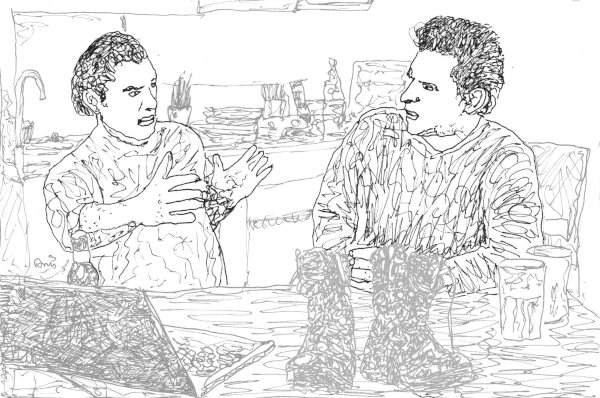 |
(Italiano) Quando Heinz torna da un seminario, trova l'appartamento in uno stato desolato. Helmut racconta all'amico del suo nuovo lavoro, ma Heinz non sembra molto entusiasta della direzione che sta prendendo la vita di Helmut. |
(Deutsch) Als Heinz von einem Seminar zurückkehrt, findet er die Wohnung in einem desolaten Zustand vor. Helmut erzählt seinem Freund von seiner neuen Arbeitsstelle, doch so richtig begeistert scheint Heinz von der Richtung, in die sich Helmuts Leben bewegt, nicht zu sein. Special Version | ||
2011 Helmut: Home, sweet home. Oh, Heinz, du? Ich habe erst am Abend mit dir gerechnet. |
2011 Helmut: Home, sweet home. Oh, Heinz, you here? I wasn't expecting you until the evening. |
2011 Helmut : Home, sweet home. Oh, Heinz, toi ? Je ne t'attendais pas avant le soir. |
2011 Helmut: Casa, dolce casa. Oh, Heinz, sei qui? Non ti aspettavo prima di sera. |
2011 Helmut: Home, sweet home. Oh, Heinz, ¿tú? No te esperaba hasta la noche. |
(English) Helmut's new working environment puts a strain on the boys' domestic peace. To smooth things over, Heinz agrees to have a talk in Frankfurt, but it can't be said that he has an easy time of it, even though Helmut accompanies him. |
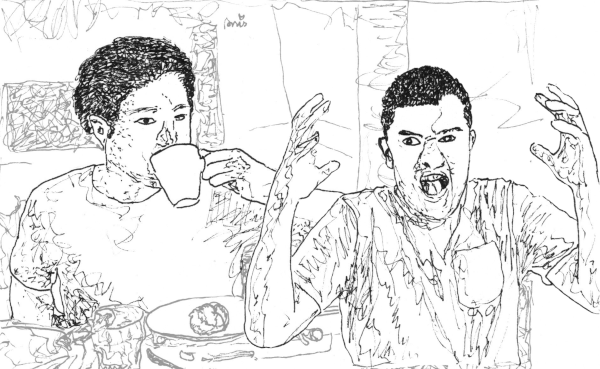 |
(Italiano) Il nuovo ambiente di lavoro di Helmut mette a dura prova la pace domestica dei ragazzi. Per appianare le cose, Heinz accetta di fare una chiacchierata a Francoforte, ma non si può dire che per lui sia facile, anche se Helmut lo accompagna. |
(Deutsch) Helmuts neue Arbeitsumgebung belastet den häuslichen Frieden bei den Jungs. Um die Wogen zu glätten erklärt sich Heinz bereit, ein Gespräch in Frankfurt zu führen, aber man kann nicht sagen, dass es ihm leichtfällt, auch wenn Helmut ihn begleitet. Special Version | ||
Die Einladung 2013 Helmut: Wow, Franklin hat uns noch frische Brötchen gebracht, bevor er weg ist. Mmh, warme Spitzweck! |
The Invitation 2013 Helmut: Wow, Franklin brought us fresh rolls before he left. Mmh, warm spitzweck! |
L'Invitation 2013 Helmut : Wow, Franklin nous a apporté des petits pains frais avant de partir. Mmh, des spitzweck chauds ! |
L'Invito 2013 Helmut: Wow, Franklin ci ha portato dei panini freschi prima di andarsene. Mmh, spitzweck caldi! |
La Invitación 2013 Helmut: Vaya, Franklin nos trajo panecillos recién hechos antes de irse. Mmh, ¡caliente spitzweck! |
(English) Helmut is sorry that Heinz missed his anniversary with Fiona because of the unexpected conversation in Frankfurt. He tries to encourage him by giving him an expensive present for her, which almost succeeds. |
 |
(Italiano) Helmut è dispiaciuto che Heinz abbia perso il suo anniversario con Fiona a causa di quella conversazione inaspettata a Francoforte. Vuole incoraggiarlo dandogli un regalo costoso per lei, cosa che quasi gli riesce. |
(Deutsch) Es tut Helmut leid, dass Heinz seinen Jahrestag mit Fiona wegen des unerwarteten Gesprächs in Frankfurt verpasst hat. Mit einem teuren Geschenk für sie will er ihm Mut machen, was auch beinahe gelingt. Special Version | ||
In der S-Bahn 21.10.2023 Heinz: Lass doch mal sehen, das Bein. |
On the Train 2023 Heinz: Let me see your leg. |
Dans le Train 2023 Heinz : Fais-moi voir ta jambe. |
In Treno 2023 Heinz: Fammi vedere la gamba. |
En el Ferrocarril 2023 Heinz: Déjame ver tu pierna. |
(English) When Fanni calls her friend and work colleague Fiona from a police station to ask her to feed her cats, Fiona is worried. After hearing Fanni's story, she not only learns that her worries are unfounded... |
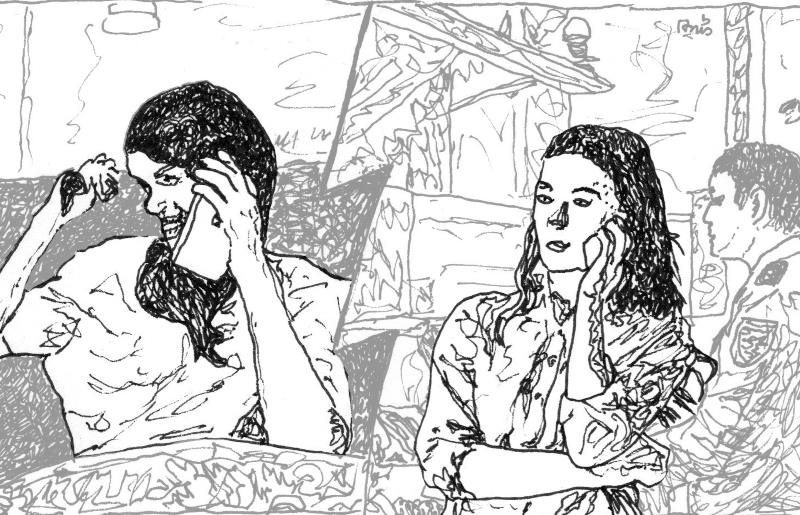 |
(Italiano) Quando Fanni chiama la sua amica e collega di lavoro Fiona da una stazione di polizia per chiederle di dare da mangiare ai suoi gatti, Fiona si preoccupa. Dopo aver ascoltato la storia di Fanni, scopre non solo che le sue preoccupazioni sono infondate... |
(Deutsch) Als Fanni ihre Freundin und Arbeitskollegin Fiona von einer Polizeiwache aus anruft, um sie zu bitten, ihre Katzen zu füttern, macht Fiona sich Sorgen. Nachdem sie dann Fannis Geschichte gehört hat, erfährt sie nicht nur, dass ihre Sorge unbegründet ist ... Special Version | ||
2023 Fiona: Hallo? |
2023 Fiona: Hello? |
2023 Fiona : Allô ? |
2023 Fiona: Pronto? |
2023 Fiona: ¿Diga? |
(English) After two weeks of radio silence, Heinz visits Helmut at the pond because there is a lot to talk about. While the fishing success leaves a good deal to be desired, the Boys at least manage to rekindle their friendship. |
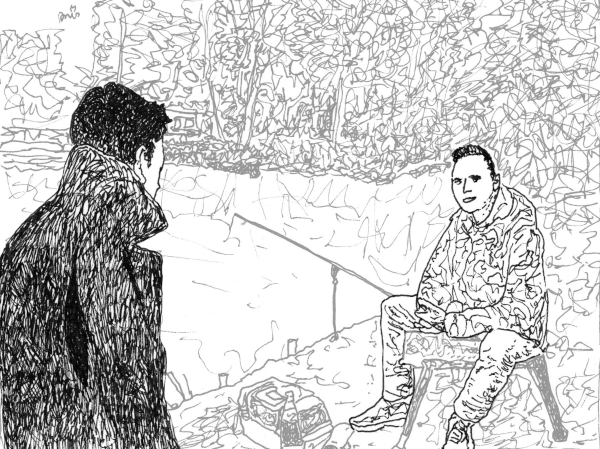 |
(Italiano) Dopo due settimane di silenzio radio, Heinz va a trovare Helmut al laghetto perché c'è molto di cui parlare. Anche se il successo della pesca lascia molto a desiderare, i Ragazzi riescono almeno a riaccendere la loro amicizia. |
(Deutsch) Nach zwei Wochen der Funkstille besucht Heinz Helmut am Teich, denn es gibt viel zu besprechen. Während der Angelerfolg zu wünschen übrig lässt, gelingt es den Jungs immerhin, einen Neugebinn ihrer Freundschaft einzuleiten. Special Version | ||
2023 Helmut: Hallo, mein Lieber. |
2023 Helmut: Hello, dear friend. |
2023 Helmut : Bonjour, cher ami. |
2023 Helmut: Ciao, caro amico. |
2023 Helmut: Hola, querido amigo. |
| Nach Nr. 35 geht es weiter mit Die Jungs auf Weltreise / Following No. 35, the story continues with The Boys' World Tour |
| up |  |
| Datenschutzerklärung und Impressum (data privacy statement and imprint) |